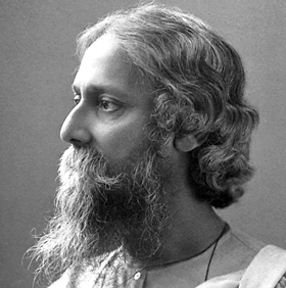Gitanjali 60
On the seashore of endless worlds children meet. The infinite sky is motionless overhead and the restless water is boisterous. On the seashore of endless worlds the children meet with shouts and dances.
They build their houses with sand, and they play with empty shells. With withered leaves they weave their boats and smilingly float them on the vast deep. Children have their play on the seashore of worlds.
They know not how to swim, they know not how to cast nets. Pearl-fishers dive for pearls, merchants sail in their ships, while children gather pebbles and scatter them again. They seek not for hidden treasures, they know not how to cast nets.
The sea surges up with laughter, and pale gleams the smile of the sea-beach. Death-dealing waves sing meaningless ballads to the children, even like a mother while rocking her baby’s cradle. The sea plays with children, and pale gleams the smile of the sea-beach.
On the seashore of endless worlds children meet. Tempest roams in the pathless sky, ships are wrecked in the trackless water, death is abroad and children play. On the seashore of endless worlds is the great meeting of children.
This poem is in the public domain. Published in Poem-a-Day on July 17, 2022, by the Academy of American Poets.
Gitanjali, originally composed in Bengali, was self-published in 1910 by Rabindranath Tagore. Later, his English translation of the book, Song Offerings, was published by the India Society of London in 1912, whereupon it won the 1913 Nobel Prize in Literature. In his introduction to the second edition, published in 1913 by the Macmillan Company, W. B. Yeats wrote, “An innocence, a simplicity that one does not find elsewhere in literature makes the birds and the leaves seem as near to him as they are near to children, and the changes of the seasons great events as before our thoughts had arisen between them and us. [. . .] Indeed, when he is speaking of children, so much a part of himself this quality seems, one is not certain that he is not also speaking of the saints [. . .]”

